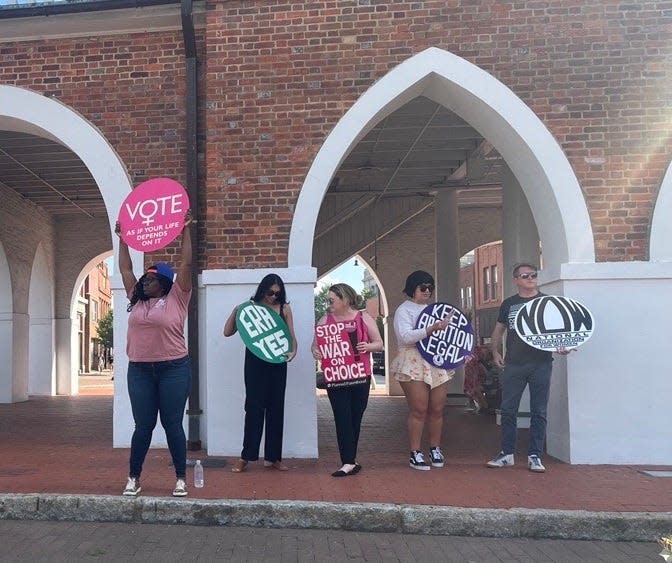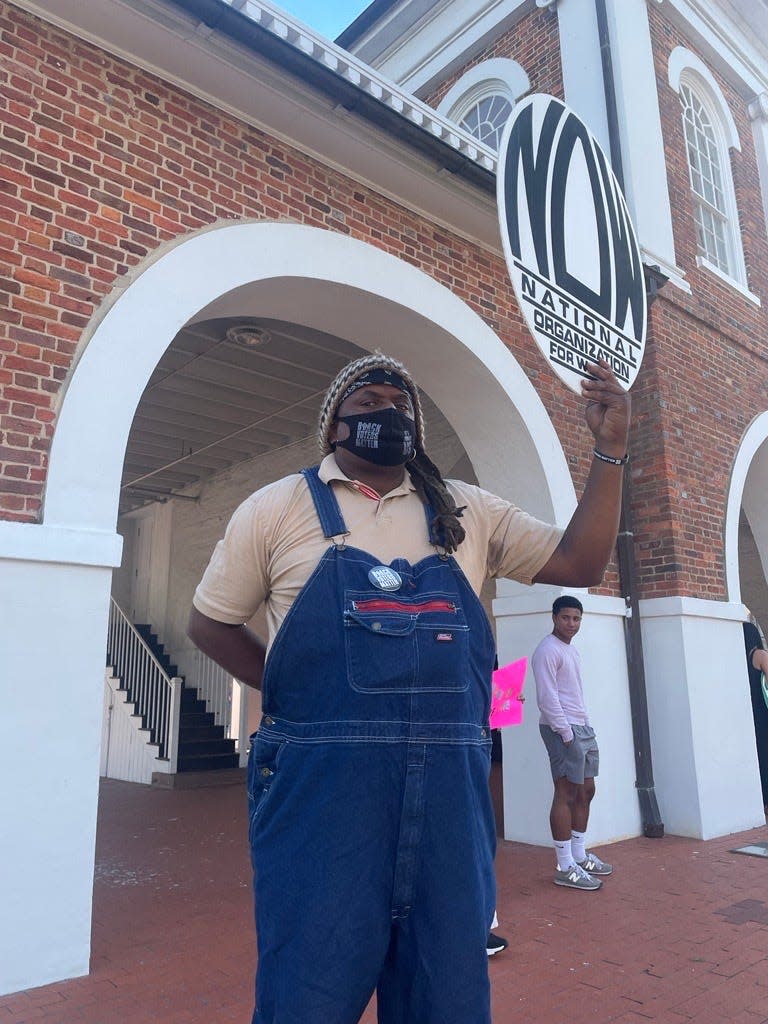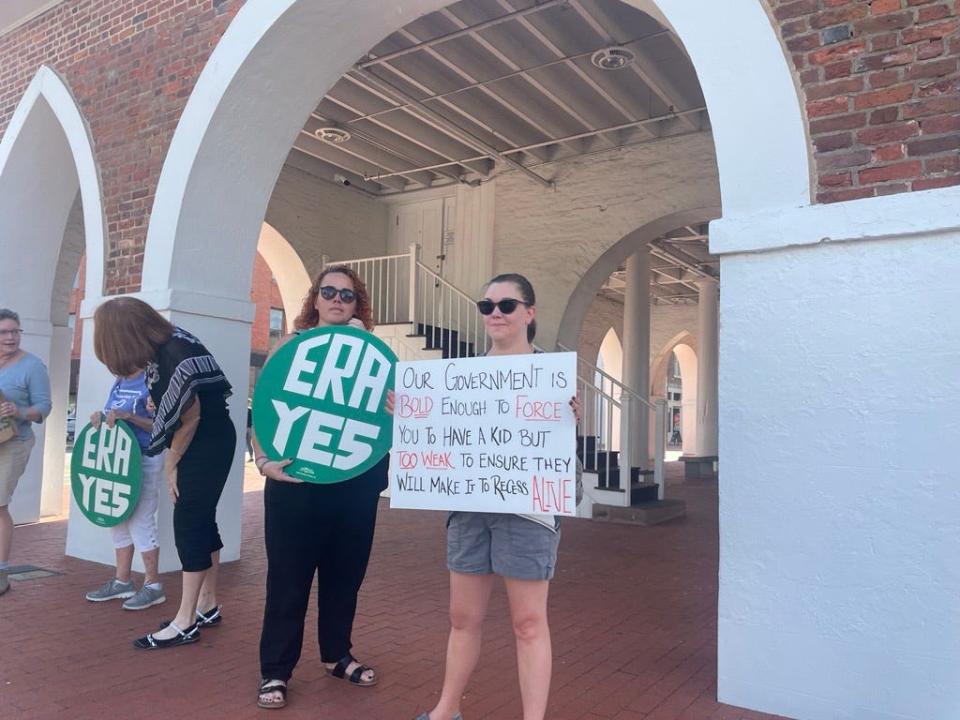'We are outraged and heartbroken and ready to fight': Fayetteville residents react to Roe v. Wade ruling

A cacophony of car horns echoed through downtown Fayetteville on Friday evening as motorists showed support to the more than two dozen activists protesting the U.S. Supreme Court's ruling on abortion rights.
Power anthems like Beyonce's "Run the World (Girls)" and Grace's "You Don't Own Me" rang out as the protestors gathered under the arches of the Market House.
"In my life, I've had two abortions," said Anastasia Rocco, holding a purple "Keep Abortion Legal" sign. "I got pregnant shortly after the birth of my second child, and I had (post-partum depression). It was the most difficult choice I've ever made."
Rocco said she showed up at the protest organized by the local chapter of the National Organization for Women to advocate for her right to choose and her daughter's right to choose.
"This doesn't stop with Roe v. Wade," she said.
For many of those in attendance, the Supreme Court's ruling not only signified an offense on women's privacy but also an offense on the Constitution itself.
"I'm a literary professor, and it's bad reading," said Kelly Walter Carney, displaying her "Women's Rights, Human Rights" sign. "That's not how you read a text. A living document... will flex, will change, will grow over time. If its meaning can't be read in more than one way, then it's propaganda. It's not a living document. It's dead."
Members of NOW and several political candidates spoke at the protest, including Sen. Kirk deViere and District 44 House candidate Charles Smith.
"Coming together today is great, but coming together in November is more important," Smith said, urging those in attendance to vote in the upcoming elections.
While noting that abortion is still legal in North Carolina, deViere cautioned the crowd not to get complacent.
"This isn't just a moment," he said. "It's a movement."
Roberta Waddle, vice president of NOW, echoed a similar sentiment.
"We can cry, slam doors, be mad, but what we have to do is vote," she said, naming the Democratic candidates in the upcoming elections. "My message to you is vote; get somebody you know to vote."
For some activists, their fight for reproductive rights has been a part of their lives for decades.
"I have been out here for years," said Ethelyn Holden Baker, a longtime resident of Fayetteville who described herself as a "late octogenarian" and an activist since her mid-teens.
Holden Baker said her mission is to educate younger generations on the cause and encourage them to get involved.
"I have a lot to fight about, and so do you," she said.
Details of the Supreme Court's long-awaited ruling
In a controversial ruling, the Supreme Court decided Friday to overturn Roe v. Wade and allow the states to again regulate or ban abortion as they see fit.
"They're turning us back to the 1700s in 2022," Pamela Carver, president of the Fayetteville chapter of the National Organization for Women, said shortly after the ruling was announced. "They are trying to apply 1787 thoughts to 2022."
Conservative Supreme Court Associate Justice Samuel Alito drafted the court's opinion, outlining that the Constitution does not guarantee a right to abortion.
3 things to know: What does the Supreme Court abortion ruling mean for NC
"We hold that Roe and Casey must be overruled," wrote Alito in the majority opinion on the ruling released Friday morning. "The Constitution makes no reference to abortion, and no such right is implicitly protected by any constitutional provision, including the one on which the defenders of Roe and Casey now chiefly rely — the Due Process Clause of the Fourteenth Amendment."

In the 1992 ruling, Casey v. Planned Parenthood, the Supreme Court affirmed the basic ruling of Roe v. Wade prohibiting states from banning most abortions.
Tony McVickers, a senior pastor at Rockfish Church in Raeford, was overjoyed by the news of the ruling.
Protesters: Abortion rights protesters gather at Market House to voice support for Roe v. Wade
"I know so many people who have prayed for this day," he said. "I look forward to the ripple of change that will spread across America as a result of this."
Justice Alito said that while the due process clause provides for some rights not explicitly stated in the Constitution, the right to an abortion is not "deeply rooted in this Nation's history and tradition."
"It is time to heed the Constitution and return the issue of abortion to the people's elected representatives," he wrote. "The permissibility of abortions, and the limitations upon it, are to be resolved like most important questions in our democracy: by citizens trying to persuade one another and then voting."

In 1973, the Court backed Jane Roe, a pseudonym for Norma McCorvey, in her case against a Texas law that made abortion illegal.
More abortion news: Abortion rights protesters gather at Market House to voice support for Roe v. Wade
Copies of Alito's draft opinion were leaked in May from the Court suggesting it might overturn Roe v. Wade, a decision that protects abortion access.
The case at hand, Dobbs v. Jackson Women’s Health Organization, pondered the constitutionality of an abortion law from Mississippi that would ban abortion after 15 weeks of pregnancy.
Local residents and organizations react
Carver said she was "not surprised" by the ruling.
"When they were talking about the leak, I'm not sure that wasn't a precursor to dull the shock of when it actually happened," she said.
Carver expressed concern that the current Supreme Court may not have the public's best interest in mind.
"I think this Supreme Court is a rogue court," she said, citing Senate Republican leader Mitch McConnell's decision to block Merrick Garland's 2016 nomination to the Court by Democratic President Barack Obama. "I think it's illegitimate."
With the Supreme Court now sending abortion rights back to the states, Carver emphasized that the fight for reproductive rights is not over.
"We're just going to have to be smarter (and) protect the lives of our women and their rights," she said.
Carver urged concerned people to be cognizant of who earns their vote.
"You have to be very mindful of who you are voting for, know their record, know where they stand," she said.
Other local groups echoed a similar message.
"For now, abortion is still legal in North Carolina," Jenny Black, president and CEO of Planned Parenthood South Atlantic, said in a statement issued a half-hour after the seismic ruling. "But this dangerous and chilling decision will have devastating consequences across the South, forcing people to travel hundreds, sometimes thousands, of miles for abortion care or potentially forced to remain pregnant against their will. Our highest priority is making sure our patients can get the care they need. Our health center doors remain open, and we aren't going anywhere."
Pastor McVickers said that "as a Christian and as an American," he believes in the right to life, citing the preamble to the Constitution which states that "all men are created equal, that they are endowed by their Creator with certain unalienable Rights, that among these are Life, Liberty and the pursuit of Happiness."
"This has been an atrocity in America for a long time," he said.
Kaitlyn Potts, a student at Fayetteville Technical Community College and president of the Cumberland County Young Conservatives, expressed similar beliefs, saying she was happy with the decision.
"A lot of people assume pro-life people are Christian, but I was born and raised Buddhist," she said. "We don't even believe in swatting a fly."
Pro-choice advocates worry that the ruling's impact will be worse in already-underserved communities.
"We need to be really clear that abortion bans impact BIPOC people, low-income people (and) people that live in rural areas at a greater proportion than everybody else," Black said by phone. "Now, the burdens and the hurdles for them accessing healthcare have become even greater, almost insurmountable." BIPOC stands for Black, Indigenous and people of color.
Many groups are viewing the ruling as motivation to fight even harder for abortion rights.
"In every day, in every way, we are going to keep fighting to make sure that people have access to the essential healthcare they need to control their bodies and build their futures," Black said. "We are not backing down from that fight, from that vision of the world that we're fighting for."
"We will not compromise our bodies, our dignities or our freedom," Black said. "We are outraged and heartbroken and ready to fight."
Immediate impact on North Carolina laws
Activists on both sides of the issue have said it is impossible for North Carolina's General Assembly to ban abortion this year. Democratic Gov. Roy Cooper supports abortion rights and the Republican-controlled legislature doesn’t have enough votes on the issue to override his veto.
The only new abortion restriction that could possibly take effect in the near future in North Carolina is a prohibition on most abortions past the 20th week of gestation. The law has been on the books since 1973 but appears to have never been enforced, according to a 2019 court order written by U.S. District Judge William Osteen Jr.
Related news: 'It's not fair': Fayetteville residents react to possible overturning of Roe v. Wade
The legislature passed a bill in 2015 adjusting the 20-week law in an effort to start enforcing the ban.
The ACLU and other abortion-rights supporters stopped the revised 20-week law in federal court with Osteen’s 2019 ruling. A 2021 ruling of the 4th Circuit Court of Appeals upheld his ruling, finding that the 20-week law violated 1973’s Roe v. Wade and 1992’s Planned Parenthood v. Casey rulings. Under Roe and Casey, states are not allowed to restrict abortion until after the point of fetal viability outside the womb, according to the Guttmacher Institute, which focuses on reproductive health issues. This is approximately the 24th to 28th week since the woman’s last menstrual period, the institute says.
North Carolina abortion providers have been administering abortions to women from other states since the 1970s. In 2020, 4,946 women from other states received abortions here, along with 25,058 North Carolina residents, according to data from the state's Department of Health and Human Services.
Many residents are worried that the ban will motivate politicians to propose stricter legislation — and not just relating to abortion.
"Quite frankly, we know what these politicians have planned," Black said. "It says so right in the opinion. They are coming for all of the other rights that were based and rooted in the same right to privacy. They're looking at contraception. They're looking at same-sex marriage. They're looking at a really broad swath of progress that we have had over the past few years."
For now, North Carolina residents should remember that abortion is currently legal in the state, Sen. deViere said.
"You've got a governor that would veto (any bill limiting abortion) and a group of legislators that would uphold that veto," he said.
Huge savings
Subscribe today to support local journalism and enjoy unlimited digital access including videos, apps, sports news, and more. Special introductory offer for new subscribers only.
This article originally appeared on The Fayetteville Observer: Roe v. Wade ruling: Fayetteville residents express grief, joy

